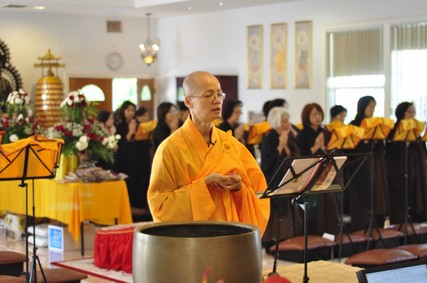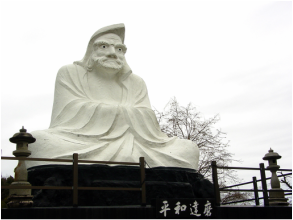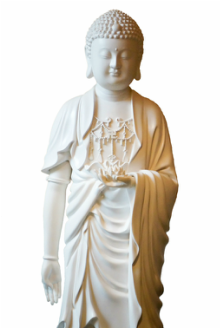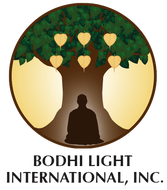Practices at Bodhi Light International
We are an association of Buddhist practitioners with the following beliefs:

Dharma Master YongHua trains both monastics and laypeople all of Bodhi Light International locations. Please click here to see our locations.
Every Saturday morning, BLI offers Chan meditation from 9-10 a.m., followed by a meditation class by Master YongHua from 10-11 a.m. And on Sundays, we hold Pure Land Assembly, which includes recitation of the Buddha’s name, chanting, and meditation, followed by a Dharma Talk. Finally, every Sunday afternoon, Master YongHua lectures on Mahayana Sutras. The afternoon lecture runs from 12:30-2:30 p.m. Both programs include a vegetarian lunch and are offered free of charge. For a detailed schedule of the weekend activities, click here.
BLI also holds two intensive month-long Chan Meditation retreats every year: one in the winter, from December – January, and the second in the early summer, from May – June. Known as a Chan Qi, these intensive retreats provide a rare opportunity for cultivators to follow the traditional Chan training schedule. This schedule includes 15 one hour blocks of meditation, which alternate with 20 minute periods of walking meditation and breaks for meals.
Participants are encouraged to participate in as much of the schedule as they can. However, as it is very rigorous, most beginning and intermediate meditators find that it is initially too difficult to follow the entire schedule, and thus are permitted to take additional rest breaks. However, in time, many people will improve and be able to sit the full schedule.
In addition, all residential trainees at Lu Mountain Temple follow a daily schedule which includes morning, evening, and lunch ceremonies, as well as work and time for personal cultivation and study.
As cultivators at Lu Mountain Temple, we devote our lives to purifying ourselves by correcting our mistakes. Furthermore, we aspire to repay our parents’ and teachers’ kindness by doing our best to help all living beings.
Chan & Pure Land Buddhism

Master YongHua teaches the principles of traditional Mahayana Buddhism, most of which he learned from the Great Master Xuan Hua, founder of The City of Ten Thousand Buddhas in Northern California. Great Master Xuan Hua brought Chinese Buddhism to the United States in the 1960’s. The Chinese Mahayana Dharma is very profound, and includes many principles and teachings that are not yet easily accesible in this country. Further, Chinese Mahayana Buddhism integrates the five major schools of Buddhism: Chan, Pure Land, Secret, Precept Study, and Sutra Study. Dharma Master YongHua also draws on all five of these schools. However, Master YongHua’s primary focus is on the parallel practice of Chan and Pure Land Buddhism in order to better serve a wider range of beings in this era: from low to high potentials.
The Chan School (which became Zen in Japan) focuses on attaining enlightenment in this lifetime. The Pure Land School, on the other hand, teaches cultivators how to be reborn to Amitabha’s Western Bliss Pure Land, where they will be able to attain enlightenment in their very next lifetime. In the parallel practice of Chan and Pure Land, we aspire to become enlightened in this life; however, we are also aware that this is an incredibly difficult goal to attain, and thus we use the Pure Land Dharma as a backup plan. In fact, the Pure Land Dharma is like an insurance policy that will enable us to keep making progress in our next lifetime, should we fail to reach enlightenment before we die.
The Chan School (which became Zen in Japan) focuses on attaining enlightenment in this lifetime. The Pure Land School, on the other hand, teaches cultivators how to be reborn to Amitabha’s Western Bliss Pure Land, where they will be able to attain enlightenment in their very next lifetime. In the parallel practice of Chan and Pure Land, we aspire to become enlightened in this life; however, we are also aware that this is an incredibly difficult goal to attain, and thus we use the Pure Land Dharma as a backup plan. In fact, the Pure Land Dharma is like an insurance policy that will enable us to keep making progress in our next lifetime, should we fail to reach enlightenment before we die.

In order to open our wisdom, Chan teaches us how to increase our concentration power, known in Buddhism as samadhi. Without concentration, it is impossible to develop insight or transcendental wisdom. And to develop our concentration, the Chan School uses meditation, which is the practice by which the Buddha himself attained enlightenment.
If we succeed in improving our concentration, we will not only progress on the path to insight, but we will also improve our health, reduce stress, and increase our stamina and mental strength. Also, as our concentration power deepens, our practice of the Pure Land Dharma will become far more effective. This is why Chan meditation techniques can be of great help to all Pure Land practitioners.
Further, the Mahayana Dharma is very rich and includes many additional practices, such as: bowing, chanting, repentance ceremonies, reciting mantras, studying sutras, developing virtue by following precepts, making offerings, and working to help support propagation and cultivation of the Dharma. In fact, according to the sutras, there are 84,000 different practices, known as Dharma Doors, which we can draw on.
Master Yong Hua provides individualized guidance to help each person find the methods that are most appropriate to their current cultivation. In his lectures, Master YongHua devotes a significant amount of time to answering questions. This allows him to tailor his teachings to the needs of individual students.
Many of the students that Master YongHua has taught over the past eight years have reached high levels of samadhi and seen significant improvements to their health and personal relationships.
If we succeed in improving our concentration, we will not only progress on the path to insight, but we will also improve our health, reduce stress, and increase our stamina and mental strength. Also, as our concentration power deepens, our practice of the Pure Land Dharma will become far more effective. This is why Chan meditation techniques can be of great help to all Pure Land practitioners.
Further, the Mahayana Dharma is very rich and includes many additional practices, such as: bowing, chanting, repentance ceremonies, reciting mantras, studying sutras, developing virtue by following precepts, making offerings, and working to help support propagation and cultivation of the Dharma. In fact, according to the sutras, there are 84,000 different practices, known as Dharma Doors, which we can draw on.
Master Yong Hua provides individualized guidance to help each person find the methods that are most appropriate to their current cultivation. In his lectures, Master YongHua devotes a significant amount of time to answering questions. This allows him to tailor his teachings to the needs of individual students.
Many of the students that Master YongHua has taught over the past eight years have reached high levels of samadhi and seen significant improvements to their health and personal relationships.
